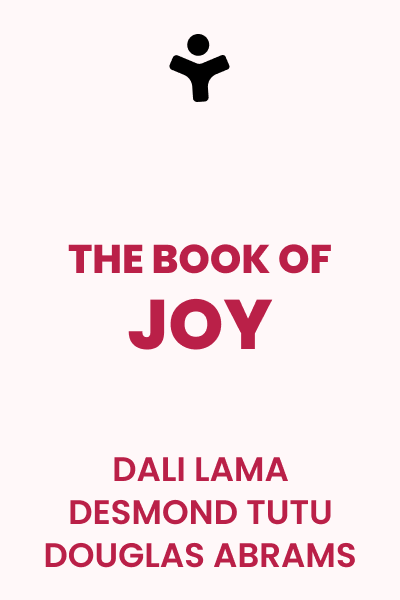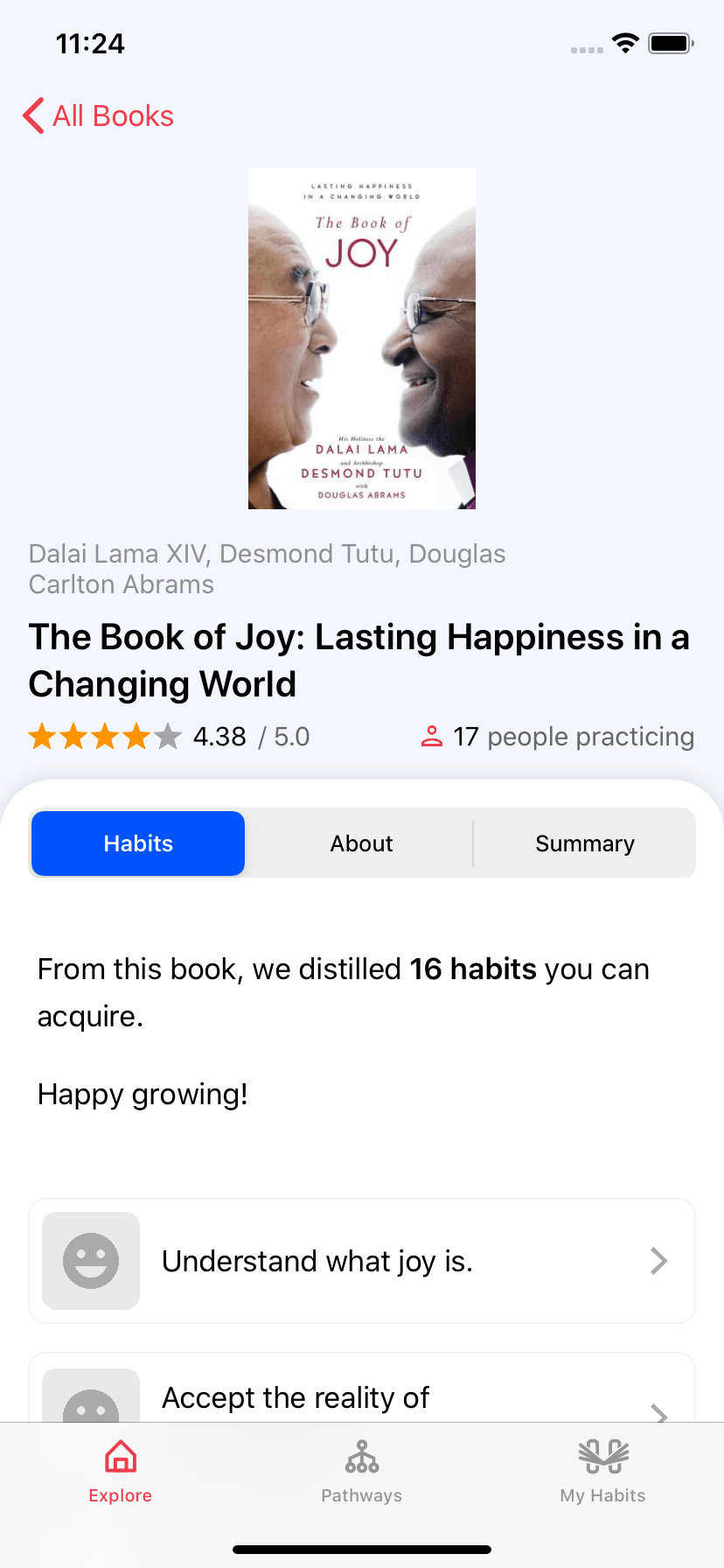
The Book of Joy: Lasting Happiness in a Changing World
by Dalai Lama XIV, Desmond Tutu, Douglas Carlton AbramsThe Dalai Lama and Archbishop Desmond Tutu spent a week together talking about living a joyful life. In this book, the eight pillars and foundations of joy are presented as the building blocks of long-term enjoyment. Besides, they also talk about their daily joy practices – they key to maintaining emotional and spiritual health.
Accept Suffering To Experience Joy
“When you experience some tragic situation, think about it. If there’s no way to overcome the tragedy, then there is no use worrying too much.”
We don't need to try to overcome suffering or tragedy if there is no means to do so. This is not a rejection of suffering or misery but a shift in perspective - away from oneself and toward others; from anguish to compassion. To overcome something painful in our lives, we must change our perspective by focusing on the opportunities for growth caused by that situation. If we see that the pain is temporary, we can deal with it more efficiently and maybe appreciate what we can learn from it, to find value in it, so that we come out not defeated but empowered.
Pain is often inevitable, but suffering is a matter of choice. Accept suffering as a part of life – stop resisting it and change your response. Our pain can be reduced if we see the suffering of others and realize that we are not alone in that. Self-centered thinking is the root of suffering, meaning that we can only feel true happiness through compassion for others.
Lasting joy is defined as “shining contentment” and “spiritual radiance,” both of which can only be attained through compassion and inner well-being.
Actions to take
Get Happiness From Right Sources
“There is a Buddhist saying that trying to seek happiness through sensory gratification is like trying to quench your thirst by drinking saltwater.”
There are two types of happiness, sensory and mental. We don't have to give up sensory pleasures like enjoying food and sex, but long-lasting and true happiness is mental - when we feel love and compassion for others. This type of happiness is more important as no sensory happiness can compensate for lack of mental happiness.
According to psychologist Sonja Lyubomirsky, immutable factors like our DNA or temperament only impact half of our happiness. The other half depends on our circumstances, attitudes, and actions – all of which we can influence. Our ability to reinterpret our events more optimistically, experience compassion, and our desire to be kind can significantly impact our happiness.
Neuroscientist Richard Davidson has put together a cohesive theory of the happy brain based on neuroimaging research. According to Davidson, four different brain circuits impact our long-term happiness: our ability to maintain pleasant states, our ability to recover from negative situations, our ability to focus and prevent mind-wandering, and our ability to be kind.
We all strive for hedonism; however, we feel the greatest joy when doing something good for others. We are more helpful to others when we can get beyond our sorrow and suffering. The more we turn toward others, the happier we feel.
Actions to take
Build Mental Immunity
“If your health is strong when viruses come they will not make you sick. Similarly, if your mental health is sound, then when disturbances come, you will have some distress but quickly recover. If your mental health is not good, then small disturbances, small problems will cause you much pain and suffering.”
Everyone tries to prevent pain by increasing their physical immunity, but we forget to work on strengthening our mental immunity. Just as a strong immune system protects our body from harmful viruses and germs, mental immunity cultivates a positive mental attitude that makes us less vulnerable to unpleasant thoughts and emotions. Developing mental immunity means learning to avoid damaging emotions while cultivating pleasant ones.
To develop mental immunity, we must view unpleasant experiences as challenges we must solve cognitively while remaining calm on a deeper, emotional level. Just like the ocean has many waves on the surface, but is very quiet below the surface.
So much of our stress arises from our impression of ourselves as separate from others. To cope with this feeling, we should think of others who have survived, even thrived, in similar or worse circumstances and feel a connection.
Researchers have discovered that chronic stress slows down our telomeres – the DNA caps guarding our cells against disease and aging. We need to turn stress into challenges. For example, say to yourself, ”Fear, which causes me stress, I transform into a challenge to be brave.” “I turn sadness, which creates stress for me, into a challenge to be resilient and compassionate.”
The Dalai Lama says we can change our emotions by changing our perspective. We can use this to build mental immunity and resilience in life.
Actions to take
Overcome The Enemies of Joy
“If the one you have lost could see you, and you are determined and full of hope, they would be happy. With the great sadness of the loss, one can live an even more meaningful life.”
We encounter many obstacles on the path to true joy – such as anger, sadness, grief, despair, loneliness, envy, and fear of illness and death. But where there is an enemy, there is an ally that can help us overcome such obstacles in life.
An ally in overcoming anger is to realize that it does not serve us. We should recognize how useless anger is. One strategy for overcoming anger is to ask ourselves where that anger comes from.
An ally in overcoming sorrow is purpose. The best approach to get through this pain and grief is to turn it into drive and a new sense of purpose. Temporary sorrow can lead to increased empathy or compassion, which is necessary for us to feel better.
According to psychologist Gordon Wheeler, grief serves as a reminder of the intensity of our love. Despair can result from a painful loss, but it can also protect against devastating disappointment. Hope is the ally and the antidote to despair.
The ally for loneliness is a connection with others. When we spend too much time focusing on ourselves, we become estranged from others.
Fear of death and illness are the greatest enemies of joy, and the ally is acceptance. We should accept that everything, including ourselves, has an end. The accurate measure of spiritual advancement is how one accepts one's own mortality.
The last obstacle to joy is envy – the feeling of comparing oneself to others – and it may be a significant source of dissatisfaction. Gratitude and mental reframings are excellent allies and antidotes to envy; we must question why we desire what others have. The most important thing is to develop concern for the well-being of others.
Almost all our negative emotions and reactions can be controlled or reformulated when we think rationally.
Actions to take
Implement The Mind Foundations Of Joyful Life
“If something can be done about it, what need is there for dejection? And if nothing can be done about it, what use is there for being dejected?”
Psychological immunity is built on the foundations of positive perspectives, thoughts, and feelings, and these are the qualities that allow us to live joyful lives. These qualities are classified into two categories: mental qualities and heart abilities. Perspective, humility, humor, and acceptance are examples of mental power, whereas forgiveness, gratitude, compassion, and generosity are examples of heart power. Let’s first focus on the mind foundations of joy.
Perspective
Since we create misery and suffering for ourselves, we can also create happiness through conscious work on the way we perceive our lives. A healthy and realistic perspective of life is the root of joy and happiness. Buddha claims we build our reality with our minds. One of the most powerful ways to practice perspective change is meditation or self-distancing.
Humility
Humility allows us to laugh at ourselves, and a proper sense of humor is required to cultivate joy.
Humor
Life is challenging, and humor helps us deal with the ironies, cruelties, and uncertainties that we face. Laughter and humor can help us cope with worry and stress. The ability to deal with life through humor is a skill that is learned and practiced. Once it is incorporated into everyday life, it becomes filled with ease and joy.
Acceptance
Our expectations of how life should be, cause stress and worry. Acceptance enables us to interact with life on its terms rather than railing against the reality that life is not as we would like it to be. Acceptance's opposites are resignation and failure. We may accept our lives in all imperfections if we can see everything from a larger perspective.
To start cultivating joy, we should develop strong foundations of quality perspective, humor, acceptance, and humility skills, and later upgrade this happiness system with forgiveness, gratitude, compassion, and generosity.
Actions to take
Implement The Heart Foundations Of Joyful Life
“We humans have a special brain, but this brain causes a lot of suffering because it is always thinking me, me, me, me. The more time you spend thinking about yourself, the more suffering you will experience. The incredible thing is that when we think of alleviating other people’s suffering, our own suffering is reduced. This is the true secret to happiness.”
To strengthen our ability to live happily, we must build what the Dalai Lama calls the "heart qualities of a joyful life.” This includes forgiveness, gratitude, compassion, and generosity.
Forgiveness
People often hurt us because of some bad condition we are in. When we understand that all people can be wrong, we forgive easily. If you recognize your common humanity, you may let go of your imagined entitlement to vengeance and focus on healing rather than payback. We frequently need to forgive and be forgiven simultaneously, embracing our role in the human drama.
Gratitude
Gratitude is giving importance to everything that has contributed to our good life. It enables us to focus on the positive aspects of our lives instead of the negative. Gratitude leads to joy because it may activate the brain's pleasure-producing reward circuits.
Compassion
When we help others, endorphins are released in our brain, resulting in the "helper's high." That pleasant feeling from helping others is generated by oxytocin, a hormone that provides health benefits. Compassion heals; we should also cultivate self-compassion as well.
Generosity
Generosity is an outgrowth of compassion and is crucial in all faiths because it shows a fundamental aspect of our connectivity and mutual need. Generosity is so crucial to our survival that the reward parts of our brain light up just as brightly when we give as they do when we get. When we cultivate generosity, we strengthen all foundations of joy.
Actions to take
Don’t just read. Act.


